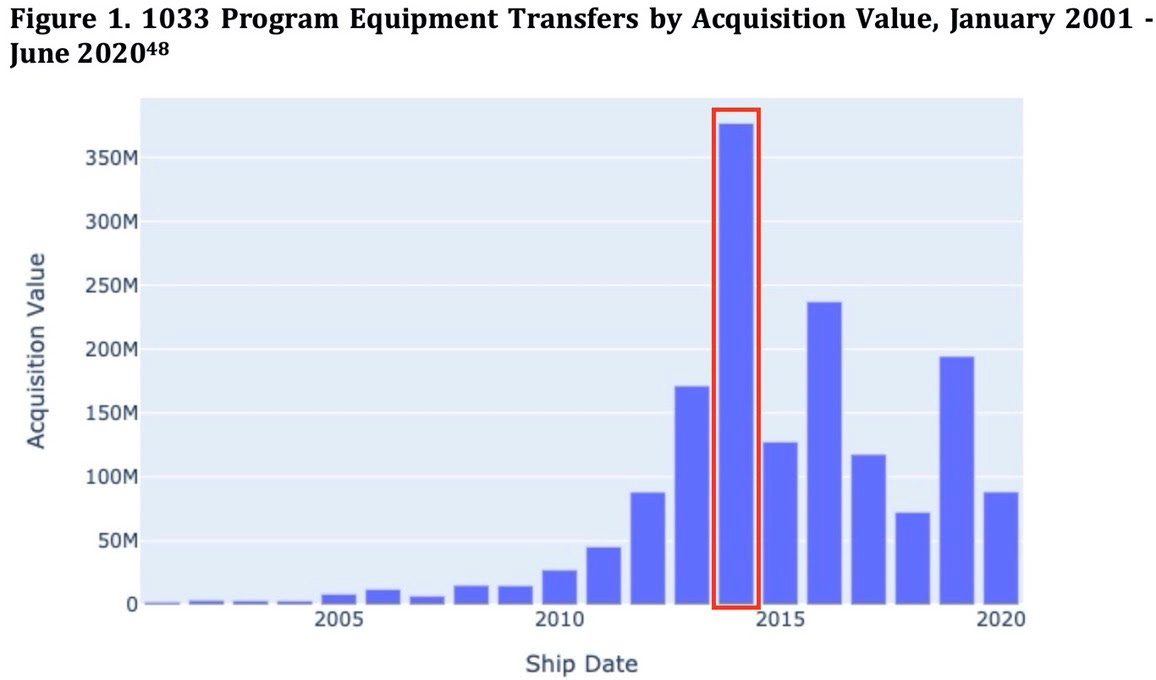Resisting, not reforming: theatrical progressivism in foreign policy
Speaking Security Newsletter | Advisory Note for Organizers and Candidates, n°48 | 28 September 2020
Three common ways Democrats pass off bad policy for “resisting” Trump, with Rep. Carolyn Maloney (D, NY-12) deployed as a case study.
“Demilitarize the police”
In a press release explaining her No vote on the House version of Trump’s 2021 military budget, Maloney cites the bill’s failure “to demilitarize the police by staying silent on the 1033 program,” the 1033 program being the foremost mechanism by which military hardware is transferred to police.
But in 2014, she voted against an amendment that would’ve restricted the 1033 program in a much more meaningful way than what’s being offered in Congress now. Was the 1033 program relevant in 2014?
It’s possible that Maloney was unaware of the 1033-related transfers for 2014 in particular. But she had more than enough information at her disposal to know better, namely:
1. The US had recently conducted drawdowns from Iraq and was in the process of doing so for Afghanistan, both of which introduced a new supply of armaments for police.
2. The Obama administration had already demonstrated that it was basically fine with militarized police units being deployed against protestors (see Occupy protests).
“Anti-war”
After Trump authorized the assassination of Iranian general Qasem Soleimani, congressional Democrats introduced the Iran War Powers resolution, aimed at curbing Trump’s ability to take similar Executive military action in the future. Maloney supported the resolution, but three weeks prior to Soleimani’s assassination, Maloney voted for the final (“conference”) version of the 2020 NDAA (S. 1790), which had stripped out all the language from the House version that would have restricted Trump’s ability to use military force in the same way as the Iran War Powers resolution.
Even if Maloney gets up to speed on confronting the legal authorizations that permit war, there’s no indication that she’s interested in confronting the defense budgets that make war possible in the first place. In addition to voting for Trump’s last military budget (2020 NDAA), she also supported his first (FY2018 NDAA). Maloney also voted against an amendment to reduce DOD spending by just 1 percent in 2018 (H.Amdt. 635 to H.R. 5515) and did the same in 2016 (H.Amdt. 1034 to H.R. 4909).
Taken together, what we’ve got with Maloney is someone who apparently thinks this sort of military footprint (below) is OK or is somehow separate from being anti-war, but it’s not — defense budgets allows the US to situate military assets in these places, and the primary justification for the Soleimani assassination (and other instances of US military action across time) was to protect ‘our troops’ in the region. In short: you can’t be anti-war without being anti-imperialist.
^Source (map is from a 2018 report but these numbers are still about right).
“Oversight”
Contrary to some other committee chairs, Maloney holds House Oversight Committee hearings regularly, and has used hearings to voice concern over a previous instance of DOD misusing public funds. She can and should do the same this time regarding DOD’s transfer of ~$1 billion in COVID relief funds to buy military equipment:
But this could’ve all been avoided had Congress 1) not given DOD money through the CARES Act, or 2) written better legislation. For the latter, all it would’ve taken was for Congress to include language in the CARES Act that explicitly prohibited DOD from reprogramming money in this way. Democrats included one such provision, but it only prohibited DOD from transferring money to fund construction of Trump’s border wall (Congress still authorized DOD to transfer upwards of $4 billion via the 2020 Appropriations Act, $3.8 billion of which went to Trump’s border wall). The anti-Trump-wall provision could have simply been replicated and repurposed to prevent this type of abuse.
This basic error implicates all Democrats in Congress, but especially the Oversight Committee Chair. One explanation is incompetence, but I don’t think that’s it. A more convincing one relates to Maloney’s voting record on the core legal issue at play with this scandal, which is DOD’s reprogramming authority, aka the level of autonomy it has to move around congressionally-authorized funds within its own budget, even/especially if the transfer(s) deviates from congressional instruction. Congress thinks its bill language (the stuff that authorizes DOD to spend a certain amount of money on a certain thing) is legally-binding, while DOD doesn’t.
There’s indication that Maloney’s already sided with DOD on this one. In 2015, she voted against an amendment (H.Amdt. 471 to H.R. 2685) that would have prohibited DOD from moving $1.4 billion in funds Congress appropriated for different purposes to one DOD’s ‘slush fund’ accounts.
So yes, this is a recurring issue and no, I wouldn’t count on Maloney to present any meaningful oversight to DOD misuse/abuse of public funds moving forward.
Conclusion
Keep fighting for a better Congress, in New York’s 12th and beyond.
Thanks for your time,
Stephen (@stephensemler; stephen@securityreform.org)
Find this note useful? Please consider becoming a supporter of SPRI. Unlike establishment think tanks, we rely exclusively on small donations.




